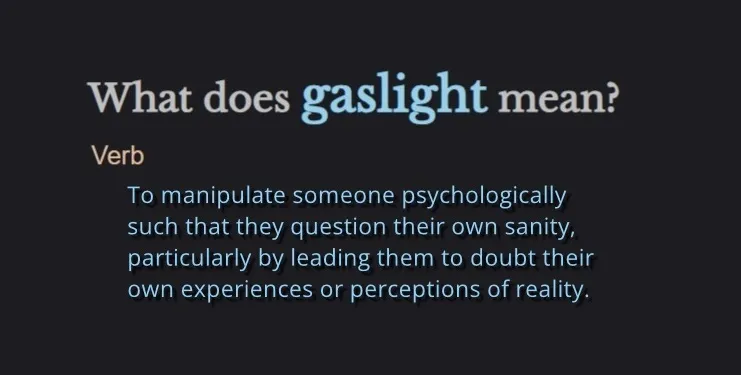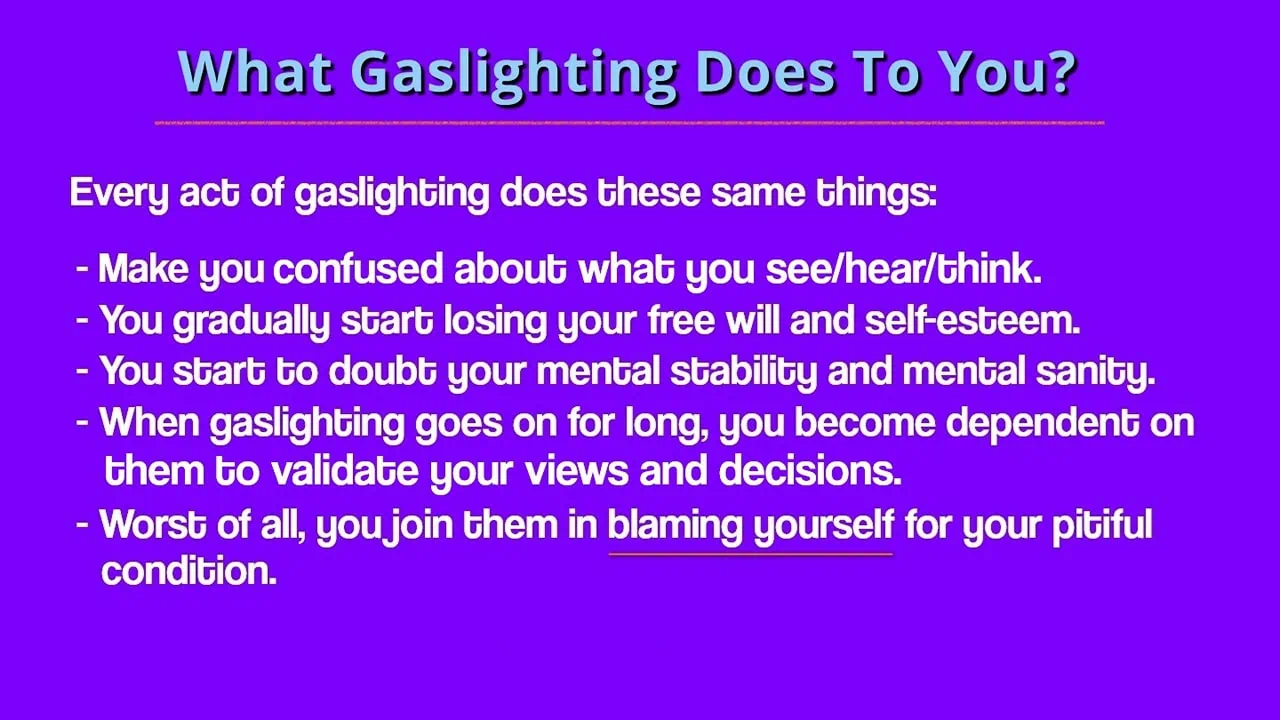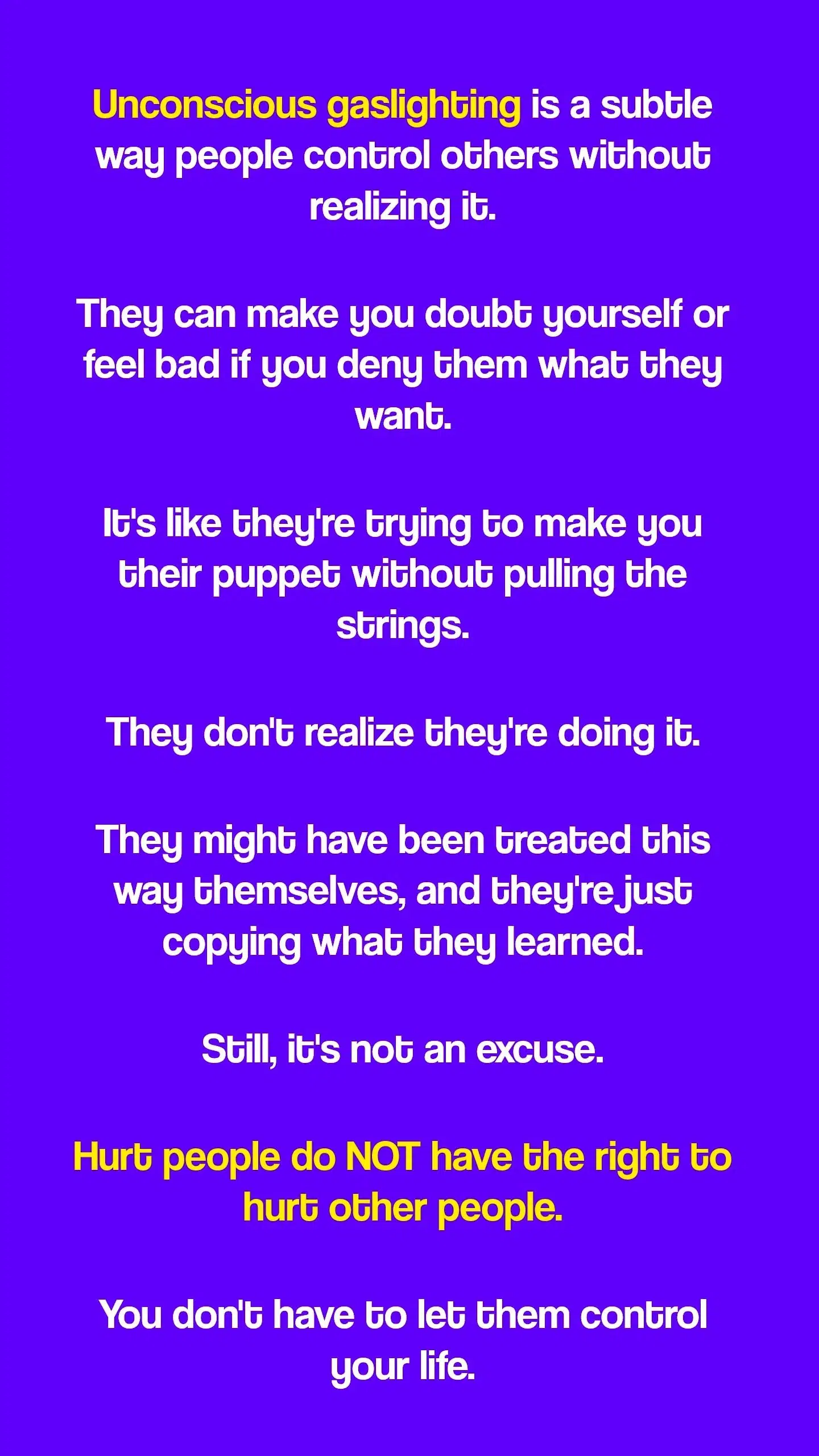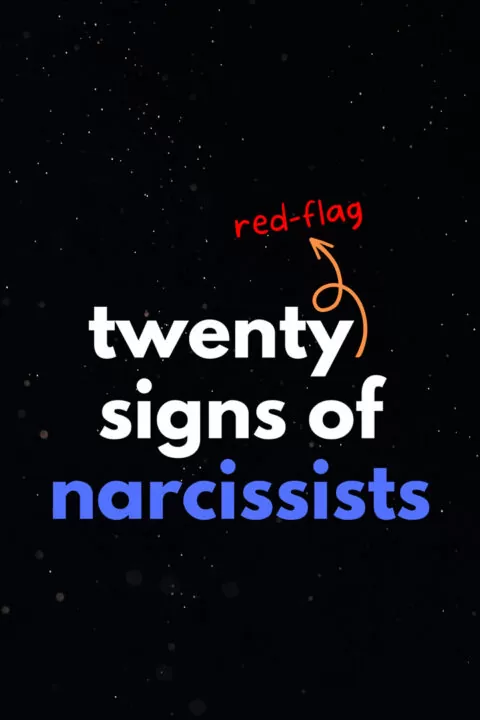Reading time: 12 minutes
Do you always tip-toe around someone in your life, weighing if your decisions would make them happy or upset? Then you might be a victim of narcissistic gaslighting.People with Narcissistic Personality Disorder (NPD) can gaslight you for years, making you doubt your own choices and actions long after they are gone.
Gaslighting is practically true of all types of narcissists. Narcissists may not be equal in other ways, but all of them excel at gaslighting.
The term “gaslighting” was coined by Patrick Hamilton for his 1938 play Gaslight, which was later adapted into a film in 1944.
To gaslight is to fabricate a false reality.
Narcissists have mastered the art of gaslighting. Read on to find out their cleverly veiled tactics, and how to deal with it.
What is narcissistic gaslighting?
Narcissistic gaslighting is a form of mental abuse in which the narcissist gradually manipulates their target into doubting her own thoughts, memories, feelings, and instincts. This can make the victim feel confused and unsure of herself. Ultimately, she may reject her own perception of reality in favor of accepting and trusting the narcissist’s version.

- Narcissistic Personality Disorder (NPD) is a diagnosed mental health condition. Narcissists have an inflated sense of self-importance, a constant need for admiration, unjustified entitlement, and a lack of empathy. They cannot handle criticism and rejection. And tend to exploit others to get what they want.
- Gaslighting is a form of psychological abuse that involves manipulating information, memories, and perception. Gaslighters constantly use invalidation, denial, and criticism to make the victim question their own sanity and reality.
- Narcissists often use gaslighting to manipulate and control their victims. Narcissistic gaslighters deny their own abusive behavior while denying or falsifying your experiences and opinions to maintain their upper hand in the relationship.

10 Signs of Narcissistic Gaslighting
Here are ten signs that you may be being gaslighted by a narcissist:
- Dismissal of Feelings. They may dismiss your feelings and concerns by saying things like, “You’re too sensitive,” “You always overreact,” or “You have a vivid imagination.”
- Control and Isolation. They attempt to control your relationships by dictating who you should keep, or let go of, thus isolating you from your loved ones who support you.
- Undermining Self-Worth. They constantly undermine your self-worth by convincing you that others are superior or that you are inadequate.
- Decision-Making Dominance. They make most decisions in the relationship, constantly ignoring your input and opinions, or allowing you to decide only when they anticipate failure.
- Questioning Reality. They deny or twist the truth, telling you that you are hallucinating or misremembering things, making you doubt your own experiences.
- Creating Dependency. They make you feel powerless and directionless, creating the illusion that they are the only ones who can understand or help you.
- Blaming and Deflecting. They may convince you that offenses they committed were planned by you or never happened, even if you witnessed them firsthand.
- Trauma Bonding. They get you to trauma bond with them early on, making it hard to leave despite strong suspicions of gaslighting.
- Blocking and Insulting. They block you from leaving and insult you if you try, forcing you to feel the full heat of their narcissistic rage.
- Accusing You of Over-Sensitivity. They gaslight you even when you’re crying out in pain, accusing you of being overly sensitive and emotional.
Classic Traits of Narcissist Gaslighters
A narcissist can gaslight you so subtly that you may not notice it for years. They have these three typical traits:
1. They keep trying to seduce new victims.
After some time with a narcissist, you may see they are constantly trying to entice a new person with their charms.
Narcissists may seem overcritical and harshly judgmental in their old relationships, yet completely adoring and alluring in new ones.
To be honest, they can be quite seductive to those who don’t know them or have never seen a narcissist up close. In fact, their charisma may have drawn you into the relationship.
- Narcissists can start with subtle gaslighting (“Do you realize your friends think you’re an idiot?”).
- They can move to hold total control (“If you want to stay with me, you must cut all ties with them!”).
2. They leave a trail of their bad behavior.
Though they keep it hidden from everyone, narcissist gaslighters often have a track record of deception and dishonesty.
- They often harm those who entrust them with their secrets. They belittle those who are socially weaker than them.
- They have a reputation for taking credit for the good while refusing to accept responsibility for the bad.
- They seek scapegoats for their mistakes and poor performance, especially when their decisions lead to disasters.
- They are envious of other people’s success.
3. They play the victim card when caught.
When caught and confronted, narcissists can play the role of the victim like an expert.
If you ever call them out on their evil motives or bad behavior, they may try to blame you for their acts and make you feel guilty.
it’s common for them to snap back, “You made me do it!”
Narcissistic Gaslighting in Relationships
1. At Workplace
- A narcissistic coworker or boss may try to minimize and falsify your skills.
- They are notorious for stealing credit for other people’s accomplishments.
- They may also set unrealistic expectations, dismiss your efforts as pointless, and make you doubt your own abilities.
2. In Friendships
- A narcissistic friend may make you feel as if you are not contributing as much to the relationship as they are.
- They may try to monopolize your time, isolate you from your other friends, and assert their supremacy in your life.
- They may also try to control your social activities and take offense to your ideas of doing things without them.
3. In Family Relationships
- A narcissist often tries to control the entire dynamic and narrative of the family.
- They may constantly remind you that you are not genuinely a part of the family and the family would never share its deepest secrets with you.
- They may falsely accuse you of being the family’s black sheep, plotting to break the family apart.
4. In Love Relationships
- A narcissist may try to dominate the relationship, and make all of the relationship decisions unilaterally.
- They can try many tricks, including gossiping and blatant lying, to cut you off from your other social connections.
- They may also make you question your own emotions. They may cast doubts on the relationship’s authenticity.
- They can accuse you of not truly loving or caring for them, and of merely using them for your own gain.
- They try to convince you that your contribution to the relationship is not worth their time and effort.
Why do narcissists gaslight?
A narcissist gaslighter’s main goal is to convince you that you are making bad decisions, recalling false memories, and degrading into insanity.
Some other reasons are:
- To gain control over the victim’s behaviors, limit their autonomy, and isolate them socially.
- To confuse the victim’s thoughts and beliefs, making them completely dependent on them.
- To willfully hurt someone or weaken their willpower so they self-harm (like making them smoke).
- To keep the victim from leaving the relationship while lying about the negative outcomes of leaving.
- To avoid taking responsibility for their mistakes and failures, to deny saying or doing certain things, and to distort what you said or did.
- To manipulate others into doing harmful things by persuading them to believe in something false, leading them to commit regrettable actions, and then deny their role.
All to boost their self-esteem and undermine yours.
Is gaslighting in relationships the result of a power imbalance?
How can narcissistic gaslighting harm you?

- Narcissistic gaslighting can be a highly traumatic experience. it can destroy your self-confidence, self-esteem, and self-control.
- A narcissist can manipulate you into tremendous mental and physical stress, causing some vulnerable people to break down or inflict self-harm, or, in the worst-case situation, suicide.
- Repeated cycles of gaslighting and abuse can create an emotional numbness in you over time. You may forget how to feel or express happiness, sadness, or distress.
How to deal with narcissist gaslighting and recover?
With a narcissist, you never know where you stand or what to expect next. Somehow, you never feel completely safe or relaxed with them.
They can damage your mental health through gaslighting, making you lose self-confidence and self-perception.
Worse, their abuse might carry scars that can last long after they are not there with you, which can be difficult to recover from.
If you think a narcissist is gaslighting you, here’s what you can do:
1. Recognize the narcissist gaslighter’s script
The first step is to recognize that you are being gaslighted and are, in fact, being abused.
Recognize the signs of gaslighting and take them seriously. Be aware of the classic gaslighting phrases they might use.
A narcissist will often read out from a “pre-written” gaslighting script:
- That’s not what I said.
- That’s not what I meant.
- You always misunderstand.
- You are lying. You didn’t do that.
- Why are you being so sensitive?
- Can you just let it go and move on?
- I was just joking. Why do you take it seriously?
- What do you want me to say to something that never happened?
- Your insanity is getting serious every passing day. We should get you admitted.
Actually, all commercials for smoking were gaslighting scripts used by manipulative marketers.
2. Stop blaming yourself.
Narcissists can offer you bliss and then deliver damnation.
- Distance yourself from the narcissist to clear your mind and see things objectively.
- Stop blaming yourself for the abuse, which can be hard if you have been told the abuse was your fault for so long.
- A narcissist can promise to never leave your side and then disappear from your life without any warning.
- Let none of their broken promises make you think that you are to blame for failing the relationship.
Remember that it was never your fault.
3. Keep notes of who said what.
A vital step is to keep notes of what you saw and said, what they said and did, and show them when they try to gaslight you.
4. Share with a trustworthy person.
- Talk to a trusted friend or family member about what’s happening to you.
- Find a support system, whether it’s friends or family members, who will listen without judging you.
5. Seek professional help.
- Get help. Consult a therapist or counselor trained in narcissism.
- Don’t feel ashamed — it is okay to seek mental health care if you suspect relationship abuse.
- Talk to your boss or HR if you’re being gaslighted to at work.
6. Engage in a social activity.
- You deserve to be treated with respect and dignity.
- Begin to work on rebuilding your self-esteem by doing things that make you feel good about yourself, like going out with friends or volunteering at an animal shelter.
- Start making new relationships and going out on dates (even if they are solo dates) again.
Examples of narcissistic gaslighting
Narcissistic gaslighting shifts your reality in the same way that magician David Copperfield can make massive landmarks like the Statue of Liberty vanish.
While magicians only alter your reality for amusement, gaslighters do so on purpose—to make you go insane.
Example 1
You’ve been dating them for a year when you spot them making up with someone.
You start an argument with them, saying: “I saw you cheating on me!”
They may tell you, “You always suspect that I’d cheat on you. So you saw what you had been imagining. You don’t realize that it’s an outward projection of your inner stories.”
Utterly confused, you may end up telling yourself, “I might have seen it wrong.”
Example 2
A narcissist is slowly finding their way into your heart. You’re almost falling for their claim that you two are soulmates who need each other as much as oxygen.
They often lean close to tell you and sigh, “I wonder what will happen to you without me!”
Then, when you’re dreaming up a wonderful future, they can ghost you or dump you. Leaving you clueless as to what you did to offend them.
Signs of gaslighting in the movie “Tangled”
Tangled is an excellent movie for understanding narcissistic gaslighting by a caregiver.
- Rapunzel is locked in a tower for 18 years, fed a steady stream of lies about the dangers of the outside world.
- Mother Gothel builds up Rapunzel’s fears and insecurities to manipulate her, painting a distorted picture of reality and wearing her down gradually.
- But as Rapunzel steps out of the tower, and meets Flynn, she begins to see the world in a new light.
- She gradually recognizes the goodness of others and learns to peel back the layers of lies woven by her mother.
- Rapunzel’s grip on her own life grows stronger and she is finally able to confront Mother Gothel, reject her, and break free from her further abuse.
Watch therapist Jonathan Decker analyze Gothel’s relationship with Rapunzel, showing all the signs of gaslighting as defined by psychologist Dr. Stephanie A. Sarkis.
Final Words
In the movie “Gaslight,” the husband contradicts his wife’s reality and tries to make her doubt herself. She complains that every evening, the gaslights flicker and dim, which he does secretly. But he insists that the gaslights are bright, and she’s hallucinating.
When a narcissist gaslights, they distort your version of reality so much that you may believe something that is the polar opposite version.
A narcissist will gaslight by their very nature; they can’t help it. But you can learn how to leave a narcissist, even when you have no money.
When you disagree with their version, they can lash out at you with such ferocity that you get scared into believing them.
• • •
√ Also Read: 20 Gaslighting Phrases (That Narcissists & Manipulators Use)
√ Please spread the word if you found this helpful.
• Our Story!


